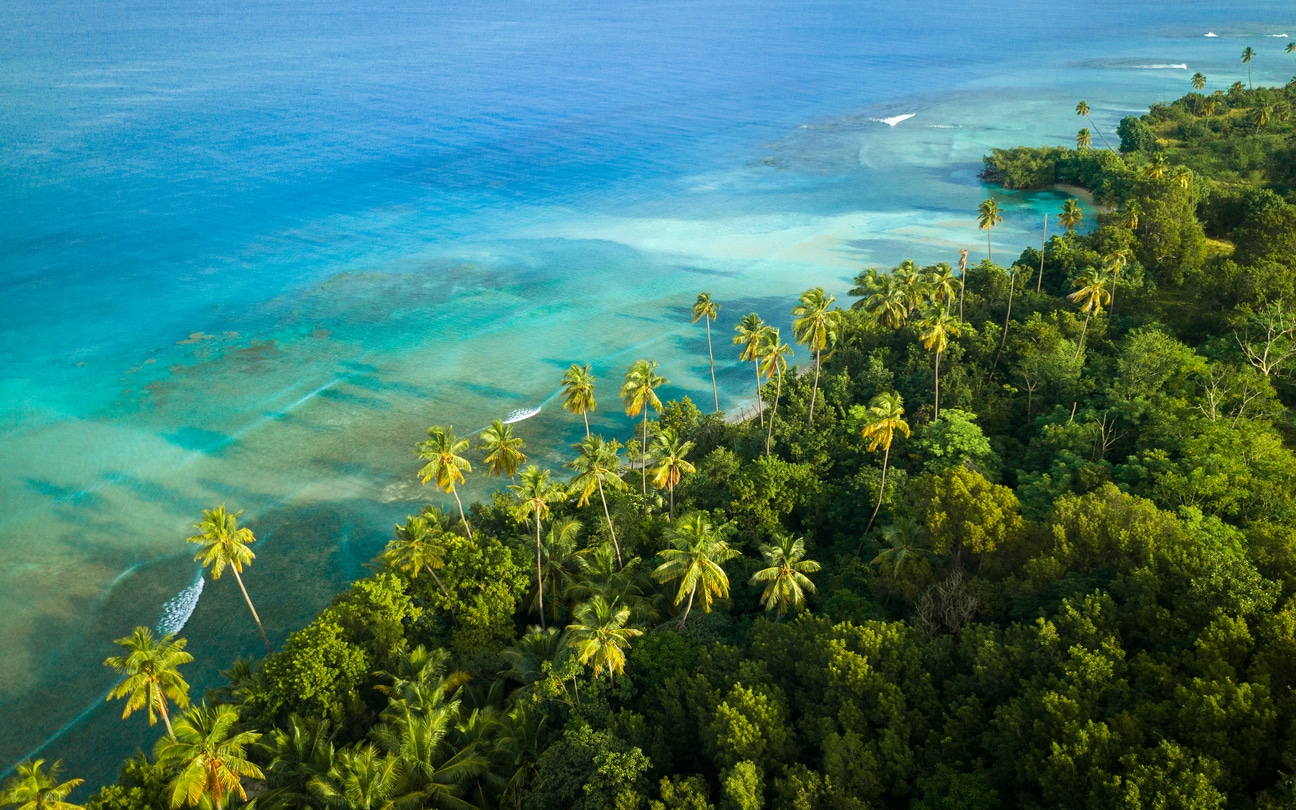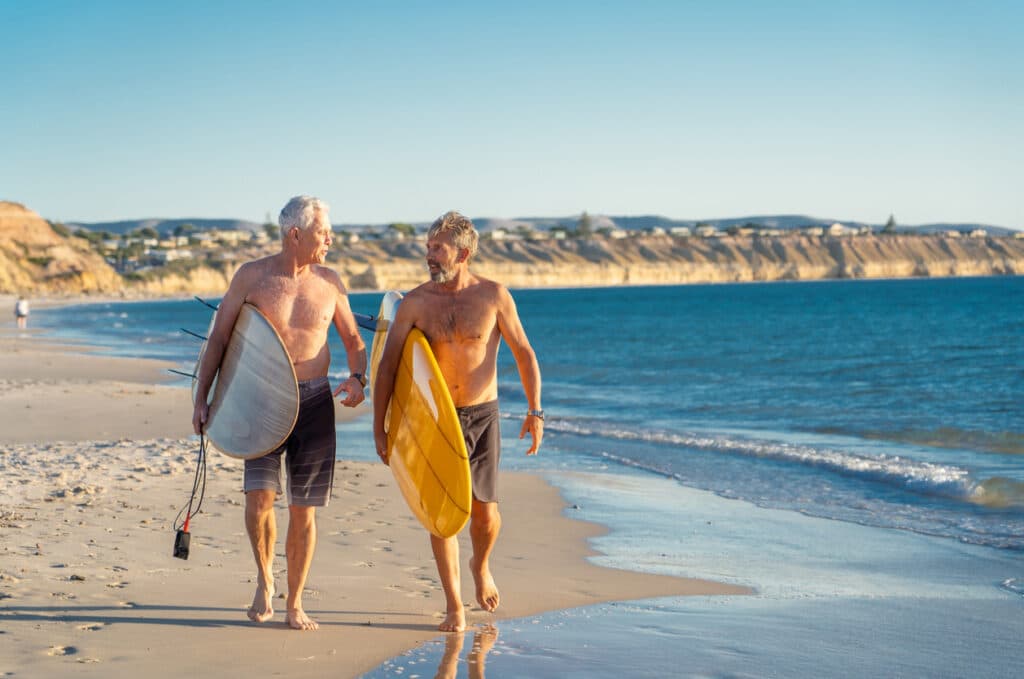If your idea of retirement paradise includes turquoise waters, palm-fringed beaches, and the ability to order a piña colada without leaving U.S. soil, then retiring in Puerto Rico might be your perfect next chapter. American retirees are flocking to this Caribbean island for more than just the scenery—its year-round tropical climate, vibrant culture, and generous tax perks make it a serious contender against Florida or even the Dominican Republic.
And here’s the kicker: because Puerto Rico is a U.S. territory, you don’t even need a passport to get there. Add in a lower cost of living compared to many U.S. cities, plus unique retirement incentives, and it’s easy to see why more expats are swapping snow shovels for sandals.
Key 2025 Updates
- Starting Jan 1, 2026, Act 60 still provides a 0% Puerto Rico tax rate on dividends, interest, and post-residency capital gains for qualifying residents.
- Puerto Rico’s cost of living is about 9% lower than the mainland U.S., with rents averaging over 50% cheaper.
- Medicare works in Puerto Rico through Parts A, B, and Advantage plans, though access and provider networks vary by location.
Legal residency in Puerto Rico: What U.S. citizens need to know
One of the biggest perks of retiring in Puerto Rico? If you’re a U.S. citizen, you don’t need to deal with immigration paperwork at all. You can move tomorrow, buy a house in Ponce, and start living the island life. But when it comes to taxes, the magic only happens if you qualify as a bona fide resident.
To be considered a tax resident (and stop paying federal income tax on Puerto Rico–sourced income), you’ll need to prove three things:
- The 183-day rule: You spend at least 183 days in Puerto Rico during the tax year.
- Main home: Your primary residence is on the island.
- Social and economic ties: Your center of life is here—not in New York, Florida, or anywhere else on the mainland.
That means updating your driver’s license, voter registration, and cutting ties that suggest the mainland is still “home.” The IRS doesn’t just look at where you sleep—it looks at where your life is rooted.
💡 Pro Tip:
Keep meticulous records. Utility bills, travel logs, even local memberships can help prove you’ve truly shifted your life to Puerto Rico if the IRS ever asks questions.
Tax benefits of retiring in Puerto Rico
For many Americans, the biggest draw of Puerto Rico as a retirement destination isn’t just the beaches—it’s the tax incentives. Puerto Rico operates under its own tax system, and if you qualify as a bona fide resident, the benefits can be game-changing.
What makes it unique:
- Under Act 60 (which consolidated Acts 20 and 22), qualifying residents can enjoy major breaks on passive income like dividends, interest, and capital gains.
- Bona fide residents don’t pay federal income tax on Puerto Rico–sourced income. That includes much of your retirement income if it’s generated locally.
- Certain types of investment income can be taxed at rates as low as 0% under Puerto Rican law, compared to much higher U.S. federal rates.
Key differences in tax treatment:
- Capital gains: Often taxed more favorably in Puerto Rico.
- Dividends and interest: May be partially or fully exempt if you qualify under Act 60.
- Social Security benefits: Still taxable under U.S. rules, since they’re not considered Puerto Rico–sourced income.
💡 Pro Tip:
Retirees with substantial savings or investments stand to benefit the most. If your income is largely passive (from stocks, bonds, or rental property), Puerto Rico’s tax system could dramatically reduce your tax bill—provided you meet residency requirements.
Social security, medicare, and retirement income
One of the most common questions retirees ask is whether their Social Security benefits will still come through in Puerto Rico. The answer: absolutely. As a U.S. territory, Puerto Rico pays benefits seamlessly—there’s no interruption when you relocate.
Here’s how it works for retirees:
- Social Security: You’ll keep receiving it just like you would on the mainland. Benefits are generally not taxed by Puerto Rico, though U.S. federal taxes may still apply if your income crosses certain thresholds.
- Medicare: You stay eligible, but the program operates differently on the island. Not all services or providers accept Medicare, so many retirees pair it with local private insurance for broader coverage.
- Retirement income: Pensions, IRAs, and 401(k) withdrawals can be treated differently depending on whether the income is Puerto Rico–sourced or U.S.–sourced. Careful tax planning ensures you don’t pay more than you should.
- Investment income: Residents who qualify under Act 60 exemptions may pay reduced or zero taxes on dividends, interest, and capital gains.
💡 Pro Tip:
Medicare alone may not give you the healthcare access you’re used to on the mainland. Combining it with local insurance helps you tap into Puerto Rico’s full healthcare system with fewer gaps.
The cost of living in Puerto Rico: Affordable or overhyped?
Puerto Rico is often touted as a retirement paradise that’s easier on the wallet than Florida or New York—but is that true, or just marketing hype? For most retirees, the answer is: it really can be more affordable, though costs depend on where and how you live.
What’s cheaper than the mainland U.S.:
- Housing: Rent or buy outside San Juan and you’ll find prices 30–50% lower than many U.S. metro areas.
- Groceries: Local produce is affordable, and shopping at farmers’ markets keeps costs down.
- Healthcare: Routine visits and treatments are significantly cheaper than on the mainland.
What can cost more:
- Imports: Anything shipped in (like cars, electronics, or even some packaged foods) can run higher due to transport costs.
- San Juan premium: Old San Juan and San Juan proper are in high demand, so real estate and daily expenses are pricier.
Budgets to expect:
- A modest retirement can be managed on about $2,000–$2,500 per month in smaller towns.
- A higher-end lifestyle in San Juan may run $3,500–$5,000+ depending on housing and extras.
Property and taxes:
- Local property taxes are low compared to the mainland.
- Homeownership is generally less expensive, though insurance costs can climb in hurricane-prone areas.
💡 Pro Tip:
The trade-off is simple—fewer imported luxuries, but more affordability, sunshine, and less daily hassle. For many retirees, that’s a deal worth making.
Healthcare in Puerto Rico: What retirees can expect
Healthcare in Puerto Rico is a blend of public services and private clinics, giving retirees flexibility in how they manage their care. While the public system can mean longer wait times, private hospitals and clinics—especially in and around San Juan—offer high-quality care at a fraction of U.S. mainland prices.
What to expect as a retiree:
- Hospitals and clinics: Puerto Rico has well-regarded hospitals, but access is best in major cities and certain gated communities where private facilities are nearby.
- Wait times: Public hospitals may involve longer waits for specialists, while private clinics usually provide faster appointments.
- Specialists and services: Many doctors are U.S.-trained, and retirees report good access to routine care, diagnostics, and chronic condition management.
- Languages: Both English and Spanish are commonly spoken in the healthcare system, which helps U.S. retirees navigate services without too much hassle.
- Costs and insurance: Care is generally far cheaper than on the mainland. Many retirees use Medicare for coverage but pair it with local private insurance to expand access and minimize gaps.
💡 Pro Tip:
Factor insurance premiums into your retirement savings plan—while routine care is affordable, private coverage gives you peace of mind and ensures you can access top facilities when you need them most.
Best places to retire in Puerto Rico
Picking the right retirement spot in Puerto Rico depends on what you want more: city energy, beachfront calm, or resort-style comfort. The island has it all, and each location comes with its own mix of affordability, community, and access to healthcare.
Top retirement destinations in Puerto Rico:
- San Juan: The vibrant capital—packed with cultural attractions, international restaurants, and the island’s best healthcare access. Housing is pricier here, but you’ll have everything within reach.
- Dorado: Known for its luxury gated communities, resort amenities, and golf courses. Perfect if your budget is higher and you’re after a resort-style retirement.
- Rincón: A laid-back surf town with a strong expat community, great snorkeling, and plenty of beachfront cafes. Affordable compared to San Juan, though healthcare access requires a drive.
- Vieques: A quieter island off the main coast, ideal for nature lovers seeking seclusion and charm. Stunning beaches, but fewer healthcare and shopping options.
- Old San Juan: Historic, colorful, and cultural—with cobblestone streets and colonial architecture. Expect higher housing costs but unbeatable atmosphere.
What matters most:
- Safety: Gated communities like those in Dorado offer strong security, while smaller towns often feel safer thanks to tight-knit communities.
- Budget: Rincón and smaller inland towns are easier on retirement savings; San Juan and Dorado lean high-end.
- Community feel: Expats often cluster in beach towns like Rincón or in San Juan, while Vieques is better suited for those seeking solitude.
💡 Pro Tip:
Balance cost with convenience—lower housing costs in rural or island locations can be offset by higher expenses for travel, healthcare access, or imports.
Is Puerto Rico the right fit for your retirement?
Retiring in Puerto Rico means enjoying Caribbean island life without giving up U.S. residency. With no passport needed, a lower cost of living, unique tax incentives, and a lively expat community, it’s no wonder more Americans are making the move.
But even paradise has paperwork. You’ll still need to pay taxes, meet residency rules, and keep both the IRS and Puerto Rican authorities happy.
Want to stay ahead of the fine print? Subscribe to the Bright!Tax newsletter for expat-friendly updates and practical insights—so your biggest decision is whether to snorkel in Rincón or sip coffee in Old San Juan.
Frequently Asked Questions
-
Can U.S. citizens retire in Puerto Rico without a visa?
Yes. Puerto Rico is a U.S. territory, so American citizens don’t need a visa or residency permit to move or retire there.
-
Do Puerto Rican residents pay U.S. federal income tax?
Bona fide residents generally don’t pay U.S. federal income tax on Puerto Rico–sourced income, though U.S.-sourced income (like Social Security) is still taxable.
-
Can I collect Social Security in Puerto Rico?
Absolutely. Social Security benefits continue seamlessly, just as if you were living on the mainland.
-
Does Medicare work in Puerto Rico?
Yes, but access can be limited. Many retirees pair Medicare with local private insurance to expand coverage.
-
What’s the cost of living like compared to the mainland U.S.?
Housing, groceries, and healthcare are usually cheaper, though imports and property in San Juan can drive costs up. Smaller towns offer a much lower cost of living.
-
Are there tax incentives for retirees?
Yes. Under Act 60, qualified residents can enjoy reduced or zero taxes on certain types of passive income, capital gains, dividends, and interest.
-
Is Puerto Rico safe for retirees?
Safety varies by location. Gated communities like Dorado and smaller towns tend to feel safer, while some urban areas may have higher crime rates.
-
Can retiring in Puerto Rico help with estate or retirement planning?
Yes, but it’s complex. A cross-border tax advisor can help structure retirement income, investments, and estate planning to take advantage of local exemptions while staying compliant with the IRS.

 Connect on LinkedIn
Connect on LinkedIn

